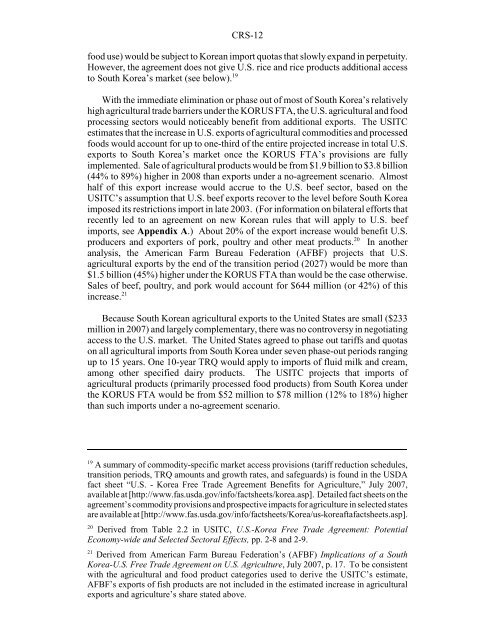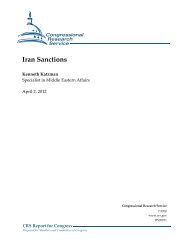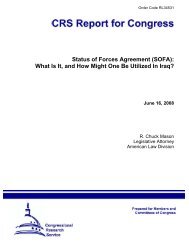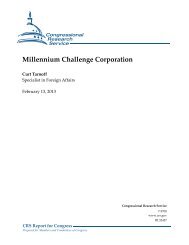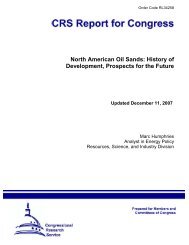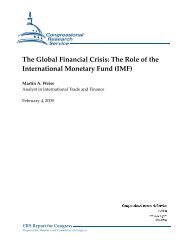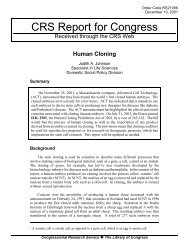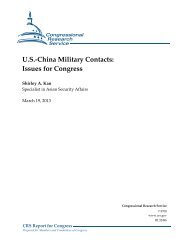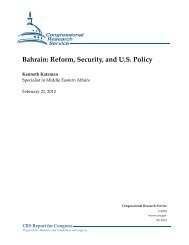The Proposed U.S.-South Korea Free Trade Agreement (KORUS ...
The Proposed U.S.-South Korea Free Trade Agreement (KORUS ...
The Proposed U.S.-South Korea Free Trade Agreement (KORUS ...
- TAGS
- korea
- fpc.state.gov
Create successful ePaper yourself
Turn your PDF publications into a flip-book with our unique Google optimized e-Paper software.
CRS-12<br />
food use) would be subject to <strong>Korea</strong>n import quotas that slowly expand in perpetuity.<br />
However, the agreement does not give U.S. rice and rice products additional access<br />
to <strong>South</strong> <strong>Korea</strong>’s market (see below). 19<br />
With the immediate elimination or phase out of most of <strong>South</strong> <strong>Korea</strong>’s relatively<br />
high agricultural trade barriers under the <strong>KORUS</strong> FTA, the U.S. agricultural and food<br />
processing sectors would noticeably benefit from additional exports. <strong>The</strong> USITC<br />
estimates that the increase in U.S. exports of agricultural commodities and processed<br />
foods would account for up to one-third of the entire projected increase in total U.S.<br />
exports to <strong>South</strong> <strong>Korea</strong>’s market once the <strong>KORUS</strong> FTA’s provisions are fully<br />
implemented. Sale of agricultural products would be from $1.9 billion to $3.8 billion<br />
(44% to 89%) higher in 2008 than exports under a no-agreement scenario. Almost<br />
half of this export increase would accrue to the U.S. beef sector, based on the<br />
USITC’s assumption that U.S. beef exports recover to the level before <strong>South</strong> <strong>Korea</strong><br />
imposed its restrictions import in late 2003. (For information on bilateral efforts that<br />
recently led to an agreement on new <strong>Korea</strong>n rules that will apply to U.S. beef<br />
imports, see Appendix A.) About 20% of the export increase would benefit U.S.<br />
producers and exporters of pork, poultry and other meat products. 20 In another<br />
analysis, the American Farm Bureau Federation (AFBF) projects that U.S.<br />
agricultural exports by the end of the transition period (2027) would be more than<br />
$1.5 billion (45%) higher under the <strong>KORUS</strong> FTA than would be the case otherwise.<br />
Sales of beef, poultry, and pork would account for $644 million (or 42%) of this<br />
increase. 21<br />
Because <strong>South</strong> <strong>Korea</strong>n agricultural exports to the United States are small ($233<br />
million in 2007) and largely complementary, there was no controversy in negotiating<br />
access to the U.S. market. <strong>The</strong> United States agreed to phase out tariffs and quotas<br />
on all agricultural imports from <strong>South</strong> <strong>Korea</strong> under seven phase-out periods ranging<br />
up to 15 years. One 10-year TRQ would apply to imports of fluid milk and cream,<br />
among other specified dairy products. <strong>The</strong> USITC projects that imports of<br />
agricultural products (primarily processed food products) from <strong>South</strong> <strong>Korea</strong> under<br />
the <strong>KORUS</strong> FTA would be from $52 million to $78 million (12% to 18%) higher<br />
than such imports under a no-agreement scenario.<br />
19 A summary of commodity-specific market access provisions (tariff reduction schedules,<br />
transition periods, TRQ amounts and growth rates, and safeguards) is found in the USDA<br />
fact sheet “U.S. - <strong>Korea</strong> <strong>Free</strong> <strong>Trade</strong> <strong>Agreement</strong> Benefits for Agriculture,” July 2007,<br />
available at [http://www.fas.usda.gov/info/factsheets/korea.asp]. Detailed fact sheets on the<br />
agreement’s commodity provisions and prospective impacts for agriculture in selected states<br />
are available at [http://www.fas.usda.gov/info/factsheets/<strong>Korea</strong>/us-koreaftafactsheets.asp].<br />
20 Derived from Table 2.2 in USITC, U.S.-<strong>Korea</strong> <strong>Free</strong> <strong>Trade</strong> <strong>Agreement</strong>: Potential<br />
Economy-wide and Selected Sectoral Effects, pp. 2-8 and 2-9.<br />
21 Derived from American Farm Bureau Federation’s (AFBF) Implications of a <strong>South</strong><br />
<strong>Korea</strong>-U.S. <strong>Free</strong> <strong>Trade</strong> <strong>Agreement</strong> on U.S. Agriculture, July 2007, p. 17. To be consistent<br />
with the agricultural and food product categories used to derive the USITC’s estimate,<br />
AFBF’s exports of fish products are not included in the estimated increase in agricultural<br />
exports and agriculture’s share stated above.


